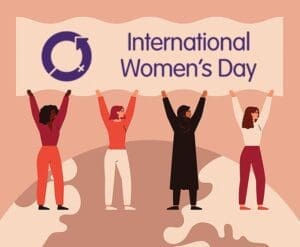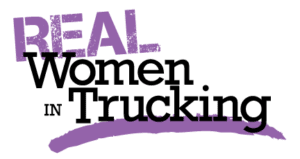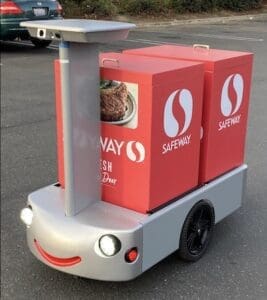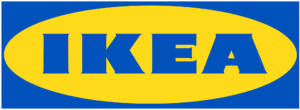 This past Monday was International Women’s Day, a global holiday celebrated annually to commemorate the cultural, political, and socioeconomic achievements of women. It is also a focal point in the women’s rights movement, bringing attention to issues such as gender equality, reproductive rights, and violence against women. This year’s theme is “choose to challenge” and for good reason. I pulled this from the International Women’s Day website: a challenged world is an alert world. Individually, we’re all responsible for our own thoughts and actions – all day, every day. We can all choose to challenge and call out gender bias and inequality. We can all choose to seek out and celebrate women’s achievements. Collectively, we can all help create an inclusive world. From challenge comes change, so let’s all choose to challenge. And now on to this week’s logistics news.
This past Monday was International Women’s Day, a global holiday celebrated annually to commemorate the cultural, political, and socioeconomic achievements of women. It is also a focal point in the women’s rights movement, bringing attention to issues such as gender equality, reproductive rights, and violence against women. This year’s theme is “choose to challenge” and for good reason. I pulled this from the International Women’s Day website: a challenged world is an alert world. Individually, we’re all responsible for our own thoughts and actions – all day, every day. We can all choose to challenge and call out gender bias and inequality. We can all choose to seek out and celebrate women’s achievements. Collectively, we can all help create an inclusive world. From challenge comes change, so let’s all choose to challenge. And now on to this week’s logistics news.
- Trucking groups line up behind bipartisan bill to boost women drivers
- Amazon spends $131 million for stake of cargo airline ATSG
- Albertsons Cos.’ Safeway tests automated grocery delivery cart
- US suspends tariffs on Scotch whisky
- Chip shortage extends beyond automotive industry
- Costco is running out of some cheese
- IKEA increases its sustainability efforts
- Cheerios calls on consumers to “bee” friendly and plant sunflower seeds
 Considering that Monday was International Women’s Day, it seems fitting to kick off the news with this story. A bipartisan bill in Congress could boost the prospects for women’s careers in transportation, at a time when female airplane pilots, truck drivers, train conductors, and ship captains retain a slim minority of jobs in the sector. Lawmakers led by Sen. Jerry Moran (R-KS) recently re-introduced a 2019 bill called the “Promoting Women in Trucking Workforce Act,” which would direct the leader of the Federal Motor Carrier Safety Administration (FMCSA) to establish an advisory board to address ways to increase the ranks of women in trucking. According to the bill, that new FMCSA board would promote organizations and programs that provide education, training, mentorship, or outreach to women in the trucking industry, and that also recruit women into the trucking industry. The bill is accompanied by an identical version in the House.
Considering that Monday was International Women’s Day, it seems fitting to kick off the news with this story. A bipartisan bill in Congress could boost the prospects for women’s careers in transportation, at a time when female airplane pilots, truck drivers, train conductors, and ship captains retain a slim minority of jobs in the sector. Lawmakers led by Sen. Jerry Moran (R-KS) recently re-introduced a 2019 bill called the “Promoting Women in Trucking Workforce Act,” which would direct the leader of the Federal Motor Carrier Safety Administration (FMCSA) to establish an advisory board to address ways to increase the ranks of women in trucking. According to the bill, that new FMCSA board would promote organizations and programs that provide education, training, mentorship, or outreach to women in the trucking industry, and that also recruit women into the trucking industry. The bill is accompanied by an identical version in the House.
 Amazon continues to work to expand its global air footprint. The company has acquired a minority stake in a cargo airline that operates a portion of its fast-growing air-cargo division. Amazon spent $131 million to acquire about 13.5 million shares of Air Transport Services Group (ATSG), the air cargo operator said in a securities filing on Monday. Amazon also acquired roughly 865,000 additional shares through an agreement in which no cash changed hands. Amazon has also acquired warrants to purchase shares in Atlas Air Worldwide Holdings Inc. and Sun Country Airlines Holdings Inc., two other carriers that operate Amazon Air jets. The purchases are contingent upon approval by the US Department of Transportation, ATSG said.
Amazon continues to work to expand its global air footprint. The company has acquired a minority stake in a cargo airline that operates a portion of its fast-growing air-cargo division. Amazon spent $131 million to acquire about 13.5 million shares of Air Transport Services Group (ATSG), the air cargo operator said in a securities filing on Monday. Amazon also acquired roughly 865,000 additional shares through an agreement in which no cash changed hands. Amazon has also acquired warrants to purchase shares in Atlas Air Worldwide Holdings Inc. and Sun Country Airlines Holdings Inc., two other carriers that operate Amazon Air jets. The purchases are contingent upon approval by the US Department of Transportation, ATSG said.
 Grocery delivery continues to be a hot topic and an area of innovation. More and more companies are exploring autonomous deliveries, and Albertsons is no exception. The company’s supermarket chain Safeway is piloting a remote-controlled grocery delivery cart in Northern California with automated logistics specialist Tortoise. According to Albertsons, the Tortoise cart provides a contactless solution for last-mile delivery of online grocery orders. Equipped with a camera and a speaker, the electric-powered cart is guided through the neighborhood by a remote operator. Customers receive a text message to come outside and pick up their groceries when the cart arrives at their home.
Grocery delivery continues to be a hot topic and an area of innovation. More and more companies are exploring autonomous deliveries, and Albertsons is no exception. The company’s supermarket chain Safeway is piloting a remote-controlled grocery delivery cart in Northern California with automated logistics specialist Tortoise. According to Albertsons, the Tortoise cart provides a contactless solution for last-mile delivery of online grocery orders. Equipped with a camera and a speaker, the electric-powered cart is guided through the neighborhood by a remote operator. Customers receive a text message to come outside and pick up their groceries when the cart arrives at their home.
 Just about a month ago, the Office of the United States Trade Representative (USTR) formally announced that it would not be revising tariffs the Trump administration imposed on wine and other alcoholic beverages. Well, it looks like things have thawed. Late last week, the US suspended tariffs on Scotch whisky for four months, during which the two sides will attempt to come up with a long-term solution to the long-running Boeing Airbus dispute. Since the tariffs were imposed, exports of single malt Scotch whisky have fallen by more than a third — amounting to more than £500 million in losses since October 2019.
Just about a month ago, the Office of the United States Trade Representative (USTR) formally announced that it would not be revising tariffs the Trump administration imposed on wine and other alcoholic beverages. Well, it looks like things have thawed. Late last week, the US suspended tariffs on Scotch whisky for four months, during which the two sides will attempt to come up with a long-term solution to the long-running Boeing Airbus dispute. Since the tariffs were imposed, exports of single malt Scotch whisky have fallen by more than a third — amounting to more than £500 million in losses since October 2019.
Last week, I wrote about the impact the semiconductor chip shortage has had on the automotive industry. The global chip shortage is not just hitting the auto industry, even though it is garnering the most media attention. The global shortage is impacting everything, with gaming consoles such as Sony’s Playstation 5 and Xbox’s Series X feeling the impact. The chip shortage is so severe that people have been camping out to buy Nvidia’s graphics processors. Qualcomm, the world’s biggest mobile chipmaker, can’t get enough processors to meet the demands of its handset customers, and warns that the shortage may not end until late 2021.
 While some people are worried about a chip shortage, others are more worried about a cheese shortage. Costco is having trouble stocking imported cheeses because of a shortage of shipping containers around the globe and bottlenecks at key West Coast ports, such as Los Angeles, Long Beach, Oakland, and Seattle. The combination has led to delays for suppliers shipping their goods, retailers like Costco receiving products, and higher costs along the supply chain. The problem isn’t just limited to cheese, but also seafood, olive oils, furniture, sporting goods, and lawn and garden equipment. And while experts expect the pressures to ease in the not-too-distant future, it could be tough going until then.
While some people are worried about a chip shortage, others are more worried about a cheese shortage. Costco is having trouble stocking imported cheeses because of a shortage of shipping containers around the globe and bottlenecks at key West Coast ports, such as Los Angeles, Long Beach, Oakland, and Seattle. The combination has led to delays for suppliers shipping their goods, retailers like Costco receiving products, and higher costs along the supply chain. The problem isn’t just limited to cheese, but also seafood, olive oils, furniture, sporting goods, and lawn and garden equipment. And while experts expect the pressures to ease in the not-too-distant future, it could be tough going until then.
 Sustainability efforts by leading manufacturers and retailers have increased dramatically in recent years. And while a lot of these efforts are focused on reducing carbon emissions and single use plastics, IKEA has taken a different approach. The retailer has talked about being a “climate positive business by 2030” and late last year began buying back used furniture to resell as second-hand. The company’s latest effort to reduce waste is to expand the life of its products by selling spare parts for its products. This initiative allows customers to purchase new pieces to replace broken ones, thus extending the furniture’s life and dispelling the notion that IKEA furniture is disposable.
Sustainability efforts by leading manufacturers and retailers have increased dramatically in recent years. And while a lot of these efforts are focused on reducing carbon emissions and single use plastics, IKEA has taken a different approach. The retailer has talked about being a “climate positive business by 2030” and late last year began buying back used furniture to resell as second-hand. The company’s latest effort to reduce waste is to expand the life of its products by selling spare parts for its products. This initiative allows customers to purchase new pieces to replace broken ones, thus extending the furniture’s life and dispelling the notion that IKEA furniture is disposable.
Nestle Cereals has an interesting initiative in place to help protect the UK’s dwindling bee population. The company is offering shoppers mini boxes of sunflower seeds to plant when they purchase a “better-for-you” cereal pack. The initiative is designed to raise awareness of the challenges currently facing the bee population, and upon planting the seeds, help to provide bee with the vital feeding grounds that are needed. According to Nestle, “our ‘Save the Bees’ campaign gives families a fun platform to help reverse the decline of the honey bee population, whilst also raising awareness more broadly for the challenges facing bees in the UK.”
That’s all for this week. Enjoy the weekend and the song of the week, Helen Reddy’s I Am Woman.

















